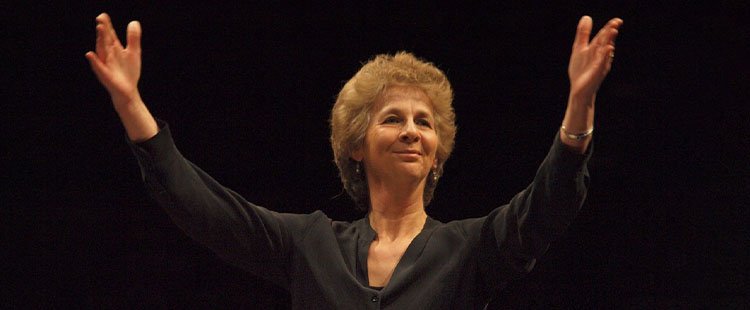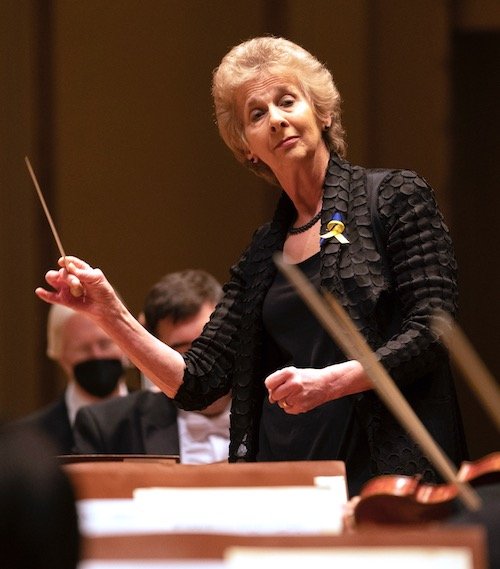By Kyle MacMillan
Since the #MeToo movement took fire in 2017 and the classical-music world has ratcheted up its efforts around gender equity, a raft of up-and-coming women conductors have grabbed the spotlight, including Eun Sun Kim, music director of the San Francisco Opera, and Anna Rakitina, assistant conductor of the Boston Symphony. But decades before these much-publicized developments, one veteran female conductor was already quietly leading by example—Jane Glover, longtime music director of Music of the Baroque.
Glover might not have the high-flying profile of other women on the podium like Marin Alsop, who holds multiple posts internationally—including chief conductor at Ravinia—or Nathalie Stutzmann, who seized the spotlight in October 2021 with her appointment as the Atlanta Symphony’s fifth music director starting in 2022–23. But the 73-year-old British conductor can boast some impressive career milestones of her own, including becoming just the third woman to conduct New York’s Metropolitan Opera in 2013.
Ravinia audiences will have a chance to see her in action September 3 when she leads Music of the Baroque in just its third-ever performance at Ravinia and its first in the festival’s expansive Pavilion. “We’re thrilled to be coming back, and we’re thrilled that we’re on, as it were, the main stage,” Glover said.
“Music of the Baroque is a very happy ensemble. Jane Glover has created an atmosphere where the best of self-expression is encouraged both in the rehearsal space and, also essentially, in the performance.”
The Chicago-based chamber orchestra, which marked its 50th anniversary in 2020–21, specializes in music from the 17th and 18th centuries, essentially the Baroque and early Classical periods. It consists of top musicians from across the Chicago area, including players who are also members of the Chicago Symphony Orchestra and Lyric Opera Orchestra.
For its first Ravinia program in nine years, the group will present works by what Glover calls the four pillars of its repertoire: Bach, Handel, Haydn and Mozart. “Here we are putting them all in one program, and I think it is a smashing program, with, of course, a stellar soloist,” she said. “I can’t wait.” That soloist is the esteemed pianist Garrick Ohlsson, who will be collaborating for the first time with the Music of the Baroque while simultaneously making his 41st appearance at Ravinia since 1981. He will take centerstage in Mozart’s Piano Concerto No. 9 in E-flat major (nicknamed the “Jenamy”). Rounding out the program is Haydn’s Symphony No. 59 in A major (“Fire”), Bach’s Brandenburg Concerto No. 3 in G major, and Handel’s Music for the Royal Fireworks, [an extravaganza of winds and strings that prompted the performance’s Pavilion setting].
Recent highlights of Dame Jane Glover’s Music of the Baroque programs include multiple presentations of The Chevalier, a concert drama imagining Joseph Bologne as a collaborator with Wolfgang Amadeus Mozart, which featured violinist Brendon Elliott (top) in that title role alongside four other actors, as well as welcoming Chicago native Anthony McGill (bottom) for an evening of Mozart where he played the composer’s Clarinet Concerto. (photos: Elliot Mandel)
This concert will mark the beginning of Glover’s 20th season with Music of the Baroque, a long tenure in today’s classical world where frequent leadership turnover is often the norm. “It’s amazing, isn’t it?” she said. “I love this relationship. Over the years, one has built up a wonderful rapport with the musicians and also with the audience. And one has been allowed to be bold in programming sometimes and yet be within our very particular niche of repertoire. I love the city of Chicago, and I feel like I’ve made extremely good friends, musically and otherwise.”
Glover got her start in conducting almost by accident when she was an undergraduate at Oxford University, studying oboe and singing in choirs. It was common for students to get together and put on concerts, and the young musician found herself overseeing some of those informal gatherings and eventually leading more formal concerts and heading the university opera society. “People came to sing for me, and it all seemed to work,” she said. “So, at the end of my undergraduate years, I really did think that [conducting] was, really extraordinarily, possibly the way to go.”
She admits being intimidated by the almost complete lack of women conductors in the field at the time, but she was undeterred. “It was very, very different landscape, when I started in the ’70s, from what it is now,” she said. “I think the landscape has changed significantly in last 10, if not even five years. It’s still not by any means an equal, flat playing field, but it is getting closer all the time, which is great. It’s just wonderful to see the way that women are finally coming forward in great numbers and securing fabulous jobs.” To that end, she co-founded the Glover-Edwards Conducting Program at the Royal Academy of Music in London, where she has taught since 2009. It provides workshops and mentoring for aspiring women conductors. “I’m very proud of that, actually,” Glover said.
Glover around the time of her 1975 conducting debut (photo: Erich Auerbach)
In 1975, four years after her undergraduate studies, she obtained her doctorate in musicology, writing a dissertation that a few years later she turned into a book on 17th-century opera composer Francesco Cavalli. But her prime focus was on performing, and she quickly managed to secure some high-profile if scattered conducting engagements, including her professional debut in 1975 at the Wexford Festival in southeastern Ireland. “But because of the ‘woman’ thing, they all attracted a lot of attention for quite the wrong reasons,” she said.
After two or three years of worrying about how she was going to pay the bills, she decided she needed to find some career stability and gain some much-needed experience on the podium. “I had never really learned my trade,” she said. “I never did a conducting course. I came from that generation where there weren’t any conducting courses the way there are now absolutely everywhere. They honestly didn’t exist in my day, and people of my generation, especially in the UK, just sort of started.”
Glover on the lawn at Glyndebourne in 1982
She decided she needed to be “small cog in a big wheel.” So, she wrote to the famed Glyndebourne Festival in East Sussex, England, and asked to be a member of its music staff. She was appointed in 1979 to the most junior post, but became chorus master within a year and was assisting such big-name conductors as Bernard Haitink and Simon Rattle. From 1981 through 1985, she served as music director of the Glyndebourne Touring Opera. “I had seven or eight glorious years there on the staff,” she said. “I learned my trade absolutely at Glyndebourne, where the standards that I pursued there I have to tried to apply everywhere I go.”
In addition to serving as music director of the London Mozart Players from 1984 through 1991, she subsequently worked with an array of top international orchestras and opera companies, ranging from the Cleveland and Philadelphia Orchestras to the Berlin State Opera and Opera National de Bordeaux. “I’m utterly at home in the theater, always have been,” Glover said, “and I love opera. But I absolutely the love the symphonic world, the concert world, too. And in an ideal year, I would have a balance between the two, because they are very different disciplines, and I’m very lucky that I do.” Highlights of 2021–22 included a return to New York’s Metropolitan Opera, where future engagements are under discussion, and her debut with the Chicago Symphony Orchestra. “That was wonderful,” she said of the latter. “Oh my goodness, what a privilege. I’ve been longing for that for some time. As I have with Lyric [Opera of Chicago], but that hasn’t happened yet.”
In her Chicago Symphony Orchestra debut in March, Glover elicited compelling performances of Handel, Haydn, and Mozart specialties. (photo: Nuccio DiNuzzo)
Although she has led all the major symphony and chamber orchestras in Great Britain and worked with many of its opera companies, work in her home country has all but dried up in recent years, and she is not sure why. “It’s mystifying to me,” she said. “People seem to think either I’ve retired, which is awful, or that I live in America, which is understandable, because I work so much in America and do have this profound attachment to Chicago.”
Her longevity with Music of the Baroque can be attributed not only to the high quality of musicianship she consistently draws from her forces but also to her collegial and respectful manner on and off the podium. “I find it a very happy ensemble,” the noted tenor and conductor Paul Agnew, a frequent guest artist with Music of the Baroque, said in an Early Music America article in 2017. “And while this might sound anodyne, there are few contented ensembles in my experience. Jane has created an atmosphere where the best of self-expression is encouraged both in the rehearsal space and, also essentially, in the performance.”
Glover acknowledges that a time will come when Music of the Baroque will probably want what she called “younger blood” at its artistic helm, but she is in no hurry to leave. “I love it more than anything,” she said, “and I’ll be crossing the Atlantic to Chicago for as along as they keep asking me.”
In addition to her work as a conductor, Glover has also gained considerable praise in the last couple of decades for her second and third music-history books, Mozart’s Women: His Family, His Friends, His Music (2005) and Handel in London: The Making of a Genius (2018). Her soon-to-be-published fourth tome, tentatively titled Mozart in Italy, springs from the research she did for her first book on the composer. It examines his three formative trips as a teenager to Italy, where he learned his operatic craft and wrote such early works in the form as Mitridate (1770). She even rented a car and followed some of the routes in Italy that Mozart followed on his voyages several centuries earlier. “In a way,” she said of the book, “it’s not only about what he loved in Italy, but it’s also a love letter to Italy from me. It was fun to do.”
One of the biggest acknowledgments of Glover’s many career achievements on and off the stage came last year when she was honored with a British damehood—the female equivalent of a knighthood—an honor that allows her to put the prefix “Dame” before her name. She received the title during a morning ceremony at Britain’s Windsor Castle overseen by Prince Charles. “I was thrilled to bits, of course,” she said. “The damehood came through during the second [coronavirus] lockdown, and, boy, did that lift my spirits. It’s just this wonderful recognition, a little pat on the back.” ●
Kyle MacMillan served as classical music critic for the Denver Post from 2000 through 2011. He currently freelances in Chicago, writing for such publications and websites as the Chicago Sun-Times, Early Music America, Opera News, and Classical Voice of North America.







